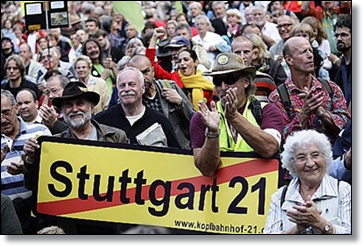Democracy Must be Nurtured
 |
| Stuttgart protest Photo courtesy |
What does this say about political structures in Kenya? Does the will of the people matter? Democracy, as Abraham Lincoln put it, means “Government of the people, by the people, for the people.” Political power starts from the people. They exercise self-determination, participate in decision making and hold their rulers accountable. Several political scientists support this input oriented view of democracy where the participation in decision-making is important.
Juergen Habermas is an important representative of this theory. The democratic process, in his opinion, is characterized by universal access to the deliberative process. If common problems must be solved in an effective, common and legitimate way, there needs to be a discourse about the common will and the different options. It is, as Habermas states it, possible to reinforce participation through discursive practice.
Certainly, the reality within states and society often makes it difficult to include the whole population equally. It is not always possible to reach a consensual solution especially in socially differentiated, plural and complex societies. However it is important to enable an open discourse, a fair process that is oriented on people. The public- political space should be opened to all. Through participation, better governance can be achieved.
It is not only in Kenya where the people’s interest is neglected from time to time. Demonstrations, Go-ins and Sit-ins also plague Europe – just to mention - human chains around nuclear power plants or the demonstrations connected to “Stuttgart 21” in Germany as examples. Even in Europe, more political participation is required. In many western countries as well, people do not feel represented adequately.
Democracy has a long way to go in Africa, Germany and Europe. Despite the fact that it will not be achieved overnight, it is possible and desirable. The length of the path should not keep anybody from treading it. It is necessary to establish a democratic culture, improve the information and resource facilities of people and to provide comprehensive political and moral education. The electorate needs to shape their respective country politics and its outcome. Only through this will it be possible to create states where people’s interest counts.
By Dorothea E. Müller.
The author is a student of Political Science and Sociology at the University of Heidelberg, Germany.
